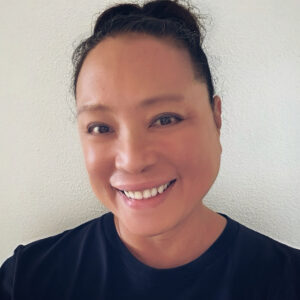Esther Calapini
PBSPED Hawkins' Scholar

"When I saw the gains (big and little gains) the students made in the time we had with them, it made me realize that when given the opportunity, students with learning disabilities can do anything especially when they have the support they need and a team of adults that believe in their potential."
Department
Special Education
Related Degrees
- Post-Baccalaureate Certificate, Special Education (PBSPED)
Why did you choose to become a teacher, in general?
Throughout my Elementary school years, I had teachers that I looked up to. But it was my fourth-grade teacher, Mrs. Kishi, who I admired the most. She had a way of making the content she was teaching very interesting and kept all of us engaged. I knew that one day I was going to be the next Mrs. Kishi. The one thing that I loved about her was that she would stop what she was doing and check to see if the class understood the content, if we didn’t then she would change tactics or strategy. She had no shame in acting out the content or putting content into song.
In my teenage years, I was asked to help teach Sunday School to the preschool-aged children at my church. I remembered the things that Mrs. Kishi did. I remembered Mrs. Kishi’s strategies and tried them on my Sunday school students. The feeling of being able to help children learn new concepts was exciting. But most of all, hearing the excitement in their voices when their parents asked what they did in Sunday school made an impression on me. I always thought back if the feeling I had was the same that Mrs. Kishi had when we got it. I knew then that I wanted to help children gain the necessary knowledge and skills that they need.
Why did you choose to become licensed in special education?
For the past 9 years, I worked as an Educational Assistant for the Hawaii Department of Education. However, it was my time at Lahaina Intermediate School that motivated and inspired me to become a licensed special education teacher. At Lahaina Intermediate School, I was assigned to a student in the Life Skills class/FSC who had severe learning disabilities and I had no clue how to work with this student. However, the teacher I worked with was not only knowledgeable but was also patient and took the time to educate and model how to work with this student. Many of the teaching strategies we used in class and with the students were similar to skills that I already had from teaching preschool. Because of this, the teacher and I built a strong relationship of trust and respect. This helped me learn more about the field because I was allowed to try different strategies with the students I worked with. When I saw the gains (big and little gains) the students made in the time we had with them, it made me realize that when given the opportunity, students with learning disabilities can do anything especially when they have the support they need and a team of adults that believe in their potential. It was at that point I decided to become licensed in special education.
Why do you feel it is important to have diversity in the classroom?
I feel that it is important to have diversity in the classroom among teachers and students because it promotes an awareness of differences that exist in the real world and that these differences can come together to learn. Having different cultures, learners, and perspectives can help students see that problems can be solved in different ways and that working together despite differences is possible. In addition, diversity in the classroom can also promote a stronger sense of community and belonging in that it acknowledges that everyone has something to contribute.
